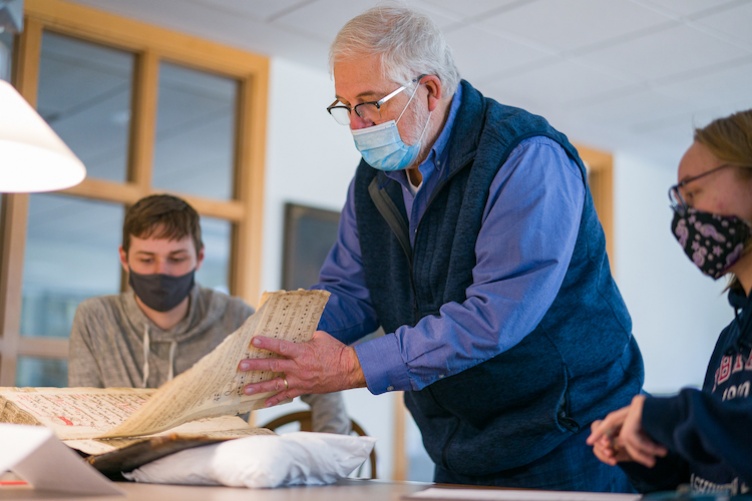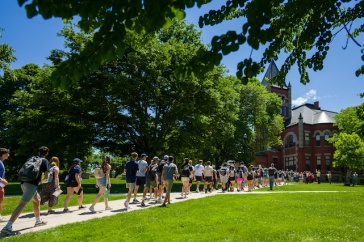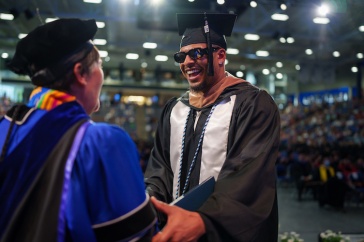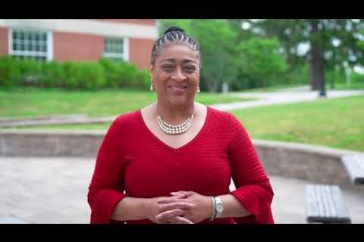
A September night in 1961 changed the lives of Betty and Barney Hill when, while driving through New Hampshire’s Franconia Notch area, they allegedly encountered aliens. It would become the first widely reported case of alien abduction in the country.
In 2006, that close encounter also changed things at the UNH Library’s Special Collections and Archives when the university acquired the Portsmouth couple's papers and tapes detailing the event.
“Word spread about the collection fairly rapidly. Visitors have included both true believers and skeptics, as well as what we described as ‘alien-abduction tourists,’” says Bill Ross, professor, Special Collections and Archives. “Before long, we had our own page in Atlas Obscura and the state put a historical marker at the site of the alleged abduction, so the significance of the collection in the public’s mind and to popular culture was established pretty firmly.”
“Before long, we had our own page in Atlas Obscura and the state put a historical marker at the site of the alleged abduction, so the significance of the collection in the public’s mind and to popular culture was established pretty firmly.”
Ross, who joined UNH in 1990 and will retire in June, recently published an article on the Hills, allowing him to revisit the collection, pieces of which were licensed by UNH Innovation in 2017 and reproduced to appear in the TBS television show “People of Earth,” among others. His article answered a call from the Journal of Popular Culture for a special issue on archives and popular culture.
“This topic was kind of a no brainer,” Ross says. “My proposal was one of a handful selected and there was nothing left to do but to write it.” Of the Hill papers and artifacts, he adds, “Taking on this collection really was an education, even for an archivist of a certain age. I have never dealt with a collection that resonated with such a large cross section of the public and with a lot of people who would never consider visiting an archives otherwise.”
Prior to coming to UNH, Ross was the university archivist at American University. He used that experience to write a grant to create the University Archives here at UNH, which started in 1992. He was also involved in planning for the 1998 library renovation.
At UNH, Ross has worked with medieval manuscripts, Colonial American documents and Civil War letters. Over the years his work also connected him with many interesting people, including jazz musicians Clark Terry and Bob Wilbur, former Senators Warren Rudman and Judd Gregg, artists Edwin and Mary Scheier and writers and poets Donald Hall, Jane Kenyon, Galway Kinnell, Charlie Simic and Don Murray.
“Our collections are a physical and intellectual extension of themselves and I have learned to appreciate that fact greatly,” Ross says. “And then there are the donors and researchers who respectively donate and use these collections. Archivists are often viewed as collectors of things; I like to think that much of our work is fostering longstanding relationships.”
Of those relationships, Ross cites the connections that he has made with UNH students as his most memorable. During his 31 years at UNH, he has hired numerous student workers and interns, many of whom have gone on to become archivists and librarians. Additionally, he has led hands-on workshops introducing students to rare books and original documents, which he says, “cultivates an appreciation of the objects and the stories that they can tell.”
Through the UNH Discovery Program, Ross was able to teach a variety of courses on such topics as the Civil War, fly fishing and New Orleans, which included trips to the Crescent City where students explored the city's cultural blend of racial influences, musical contributions and still-prevalent issues of class and poverty.
“I’m thankful UNH and the Discovery Program gave me the freedom to create interdisciplinary courses,” Ross says. “A much as I love handling unique materials, my most vivid memories of my time at UNH have been working with students. I like to think that I learned as much from them as they did from me.”
-
Written By:
Jody Record ’95 | Communications and Public Affairs | jody.record@unh.edu
















































